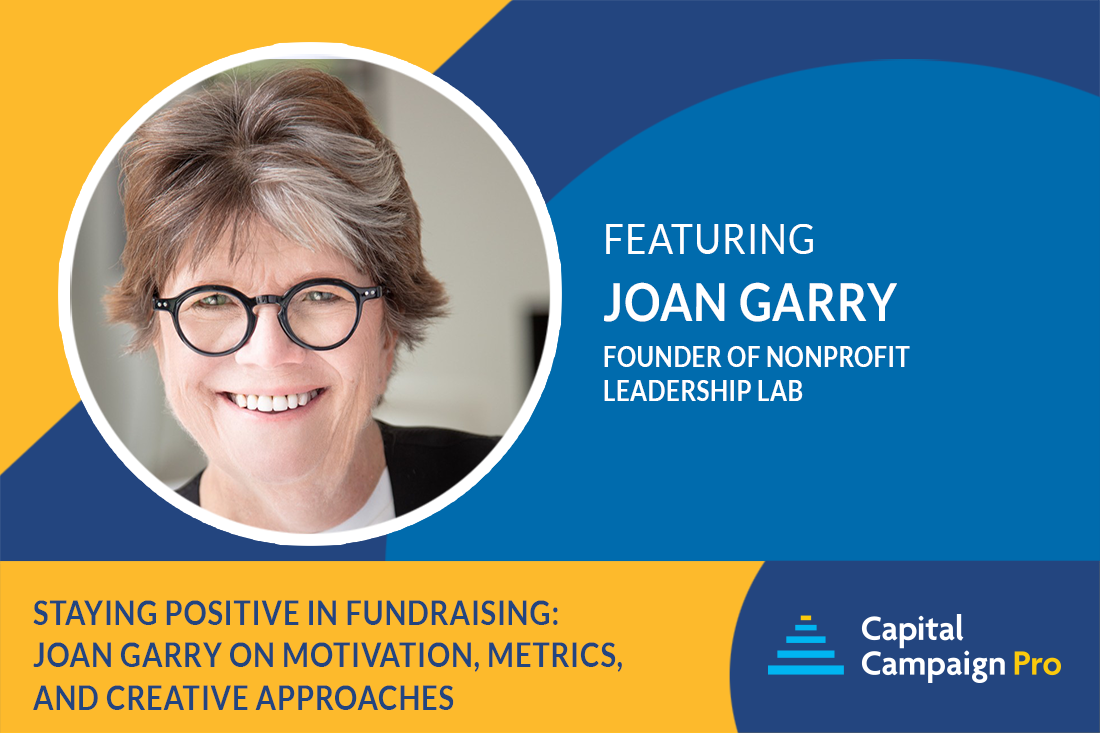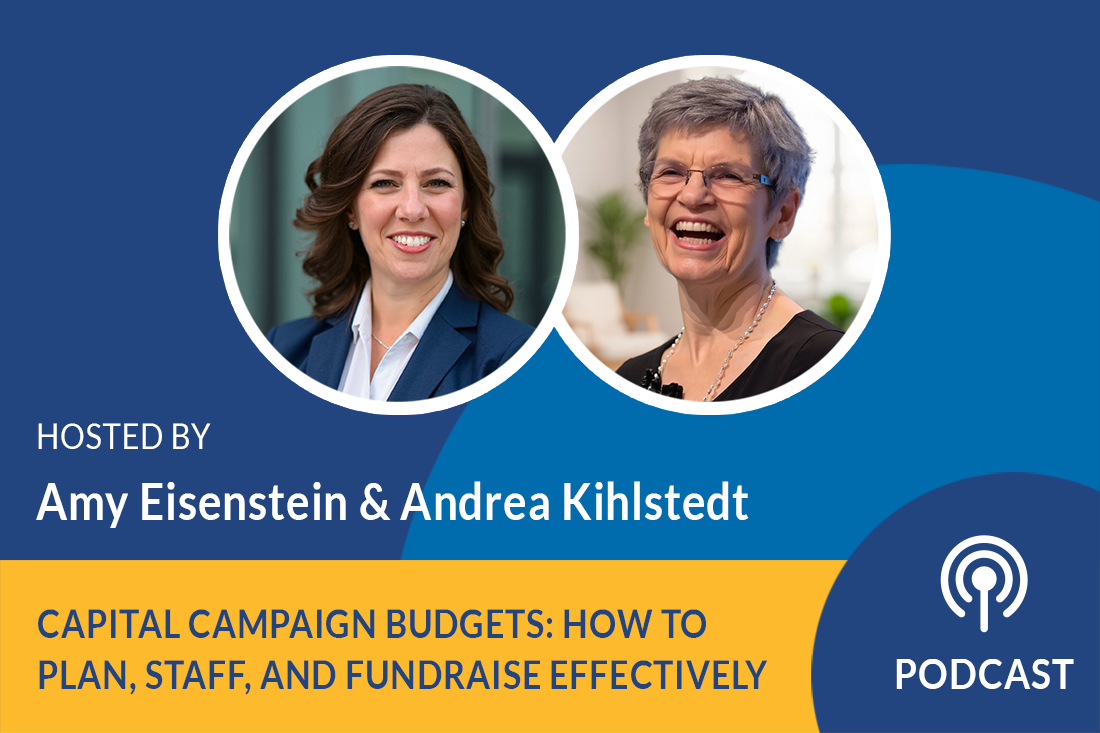Podcast: How to Overcome Capital Campaign Challenges in Tough Conditions

Season 2, Episode 56
No matter when you start a campaign, regardless of the economy, you’re going to run into obstacles. There are always unforeseen challenges. Campaign experts Amy Eisenstein and Andrea Kihlstedt discuss how to overcome the most common campaign challenges.
Listen Now:
Amy Eisenstein:
No matter when you start a campaign, regardless of the economy, you are going to run into obstacles. There are always unforeseen challenges. Stick around to learn how to overcome the most common campaign challenges.
Hi, I’m Amy Eisenstein. And I’m joined today by my friend and colleague, Andrea Kihlstedt.
Andrea Kihlstedt:
Hi, there. Nice to be with you.
Challenges Your Capital Campaign May Face
Amy Eisenstein:
And today, we’re going to talk about challenges that every campaign faces or challenges that every campaign could face. And it’s naive to expect that you won’t run into any challenges during the course of your campaign and prudent to plan for them. So the goal really isn’t to avoid challenges, but to take advantage of them as opportunities and plan for them.
So that’s what we’re going to talk about today. We’re going to share three types of challenges that many campaigns face. So, Andrea, why don’t you introduce us to the challenges we’re going to talk about today?
Andrea Kihlstedt:
Yes. Every campaign I have ever done — and I have worked on a lot of campaigns over a lot of years — has encountered some or all of these kinds of challenges. First challenge relates to staffing and leadership. It’s not uncommon to have a hard time attracting or getting a campaign chair, or to get a campaign chair and find that they actually don’t show up in the way you would hope they would show up. That’s one kind of challenge.
Not uncommon during a campaign to have a development director who decides that the work is just too onerous. They decide they’re going to leave for another job. It’s another kind of pickle campaign challenge.
There are also fundraising challenges, gifts that go awry, gifts that have been verbally pledged, but when you actually try to tie them down, they somehow magically or not so magically disappear. You can’t get them on paper in a pledge form. Gifts that look like they were, you thought they were one kind of gift, and they turn out to be quite another kind of gift. Many, many gift challenges.
And then, of course, there are project challenges. If yours is a building project, it’s very common to have zoning problems, for example, or approval problems, or headaches with your contractor or your project manager, where the architect and the project manager don’t get along. All of these things are typical and common problems that you may run into in your campaign.
Now, it certainly is true that we can’t tell you answers to all of those kinds of challenges. Those challenges all have different kinds of answers, and it depends on your particular situation what the answer will be. But what we’ve come to believe is that you can answer and deal with, positively, almost any kind of challenge if your mindset is right.
Amy, you want to talk a little about mindset?
Having the Right Mindset Matters
Amy Eisenstein:
Yeah. We’re big believers in mindset, aren’t we, Andrea? And the most peripheral or topical way to talk about mindset is believing you can and being able to do it. Or if you think you can, you can, right? So that’s surface.
But really, or maybe another example is the glass half full. But it really does make a difference if you, and your committee, and your volunteers, and your staff believe that the campaign is possible, versus an organization that thinks they have to do a campaign but doubts they can and doesn’t really think that they can do it. And sometimes the difference, truly, between campaign success or way over the top success and limping along is mindset. Everything else being equal, the same types of donors, the same types of programs. And we’ve seen both kinds.
So, I think the question is, how can you have that positive and abundance mindset, and really believe that if you put in the work and you make solid plans and you have a big vision that you can do it versus not being able to do it? And I think one of the key things that we talk about all the time, and one of the key things that we’ve found is that organizations that are willing to go out and solicit feedback from their biggest donors, and community members, and experts in the areas where they’re having challenges, if they go out and gather together a little subcommittee and say:
“Alright, here’s the challenge we’re having. How can we overcome it?”
And the expectation or the mindset is that they’re going to overcome it, they may not know how at the time of the challenge, but they have strategies in place for going out, and soliciting feedback, and getting ideas, and brainstorming with others, they do overcome those challenges.
So we want to put you in the mindset or the mind frame of this positivity, an upward cycle, if you will, that anything is figureoutable If you put the right minds and the right brains on it. I think that’s our approach to dealing with campaign challenges.
Andrea Kihlstedt:
Yeah, that’s a wonderful phrase. I think it’s from Marie Forleo, who talks about anything is figureoutable.
Amy Eisenstein:
Yes.
Andrea Kihlstedt:
I think what we often see is that when a campaign run has a problem, as it undoubtedly will, it’s easy for the executive director or the campaign manager or development director to want to hide, not to want anyone else to know that there’s a problem, to want to look good all the time, and to forget that they don’t have to be perfect. They don’t have to have all of the answers.
In fact, when there’s a problem, it’s a wonderful opportunity to reach out for help, to ask for help. And that, as people help you, as people find ways to help you through these problems, doesn’t make them feel any worse about you, it makes them feel closer to and better about the project. So that mindset of being willing to ask for help because you feel so strongly that anything is figureoutable and that this project is really important, is going to set you on the path to success.
With that mindset, you can go from one problem, to another problem, to another problem. And in solving all of those problems, you can actually build a much stronger campaign team than you would if everything were just smooth sailing and people wrote you checks and went away. They’re very different images here.
Amy Eisenstein:
And that would be nice if people just wrote you checks, but it doesn’t usually work out quite that well, not too often. But that’s not to say that you should avoid a campaign just because there will be obstacles and challenges or the economy’s bad. We see organizations run successful campaigns through all sorts of challenges, and all sorts of economies, and all sorts of pandemics.
And so, the question is, how are you going to deal with these challenges when they arise? How can you pre-plan for them, and anticipate some of them, and get ready for them as much as you can?
Let’s give some examples in each of our three areas of leadership, fundraising, and project, where most of the challenges arise.
But before we get to that, I just want to remind listeners that if you’re enjoying this podcast, we hope that you will click to follow [our podcast] so that you get every notification of future episodes. And also, you can learn more about this topic and others on our blog at capitalcampaignpro.com.
Campaign Challenges: Leadership Issues
Alright, let’s get to some examples.
I know you spouted some off as you were introducing the topics, but in leadership, you talked about challenges, finding a campaign chair, maybe keeping a campaign chair motivated. Some of the campaigns I’ve worked on, people have been worried about leadership change, staffing change, both the development director, the executive director, whether it’s foreseen or unforeseen. What do you think people can do to think about preventing or having the right mindset heading into a campaign in terms of leadership?
Andrea Kihlstedt:
One of the things that I wish people did more often as they were heading into a campaign is to pay more attention to the development team and the leadership from the perspective of having conversations to say:
“This is going to be very demanding. Let us look at ways in which we can make sure you are supported so that you will be happy to stay on through the campaign. We, the Board, do not expect you to take your very busy schedule and all of a sudden be able to raise a huge amount more money and go through a capital campaign without additional support.”
So before the campaign, you should be having the board and the head of the organization, the executive director, the chair of the board, should be having these conversations so that the people on the staff know that they are being considered and the rise in workload is being considered before they ever go into the campaign.
You need to make sure before you go into a campaign that you have a happy work environment, that people like working in that environment, that they are committed to your organization. And if they’re not, better that they leave before the campaign and you can staff up appropriately. Then they get into the middle of a campaign and say:
“This is too hard. I’m out of here.”
So, some of the problems like that can be handled by being aware and having constructive conversations before the problem ever asserts itself.
Amy Eisenstein:
Right. So you can tackle some of these challenge proactively and not wait for them to happen, and then be surprised when they do. But anticipate staff burnout. If you’re expecting them to do their regular jobs plus a campaign on top of it, what are you going to do to compensate them, to make sure that they don’t burn out, to make sure that they’re happy? And of course, everybody’s going to be working hard, but certainly, there are things that you can do to alleviate that and make it less likely that you will have staff turnover in the middle of your campaign.
Campaign Challenges: Fundraising Trouble
Alright, let’s look at fundraising. What are some of the fundraising challenges that frequently pop up in campaigns that either mindset can help with or that you can proactively anticipate and deal with?
Andrea Kihlstedt:
Well, here’s a complicated fundraising challenge that I’ve actually heard about a couple of times with some of our clients recently, and that is having a board member that has great resources, so it’s hard to discount that person, and they say something like:
“Okay, I’m going to make a big gift to this campaign. And I don’t think you need any external support at all. I don’t want to waste my money on a consultant.”
Amy Eisenstein:
Yes.
Andrea Kihlstedt:
Right?
“Go ahead and do the campaign. I’m going to put in a big gift.”
Well, in the meantime, the staff is sitting there saying, “We don’t know how to do a campaign. We’ve never done a campaign before.” The executive director is afraid to say to this board member, “Listen, we need support” because they’re afraid of turning off the million-dollar gift and everybody is stuck. Right? That’s a serious challenge.
Amy Eisenstein:
Yes.
Andrea Kihlstedt:
I mean, to me, the answer has to come from — anything about staffing needs to come from the executive director. The executive director needs to protect their staff. And if they see that the staff needs support from a professional, they need to stand up to a board member and say:
“I can’t let us go into this without having professional staff. We are not going to be successful without doing that. So, while I appreciate your views, and I understand you don’t want to waste money, neither do I, I hope you’ll still be with us, but we are going to actually bring in some people who can provide the kind of assistance we need. “
So, someone’s got to stay truth to power in a situation like that. I’m not sure money is equitable to power, but someone’s got to be able to pull a rogue board member aside, no matter how much money they have.
Amy Eisenstein:
Yes. Yes, absolutely. Alright, let’s give one more example of a fundraising challenge. And I think that is when there’s a gift that you hope for or expect even that doesn’t come through, one of the top five or ten gifts that you’re really counting on or a donor that you’re counting on, and they don’t come through with the gift at the level that you’re hoping for or perhaps that you need for the project to be successful.
So, I think this goes back to our circle, the wagons. Well, and maybe that’s a terrible analogy. Because you want to be open, you’re bringing people together. That’s what I meant by circling the wagons. I don’t mean hiding things, but bring people together, go to your other top five donors who did support the project and say:
“Listen, this one big gift that we were counting on, that we needed, isn’t coming through. Let’s brainstorm together how we can make up the difference. Who do we know who might give more? What should we do?”
And let the people who are already invested and involved help you solve the problem.
And they’re the ones with the capacity to help you solve the problem, the connections to help you solve the problem. So, as you said before, Andrea, instead of hiding from the problem, go out and be honest with your donors and say:
“Listen, we’re at a crossroads here. We’re a little stuck, and we really need your advice, wisdom, and help.”
Andrea Kihlstedt:
Perfect example, Amy. That really is a perfect example.
I can go back to the example that I talked about earlier of the board member who says, “No consultants, and I’m going to give you a big gift.” You could also go to some other board members and say, “I think we have a problem.” You could pull three or four board members together and get those board members to help you solve the problem. The model is not having to solve the problem yourself, but figuring out who you can invite for help with that.
Amy Eisenstein:
And let those other board members talk to the difficult board member or difficult donor. You don’t always have to do it as staff. You can call in other board members to say, “Can you help?” And it may go better coming from a peer. Alright.
Andrea Kihlstedt:
Exactly.
Campaign Challenges: The Project Goes Awry
Amy Eisenstein:
Topic number three is when the project goes awry. We’ve got all sorts of examples: construction, taking a lot longer than anticipated, the price of the project, construction costs going off, land falling through. The potential problems with the project are endless almost, right?
Andrea Kihlstedt:
Right. But there are also, in most communities, are people who really understand construction projects and building projects. There are developers. There are people in the real estate business. There are people who are architects. There are people with a lot of experience, probably more experience than you have. And you can get them together to help to create some kind of an ad hoc committee to help you navigate these problems as they happen. And in doing that, you will put yourself and the organization in a much stronger position. And of course, you will be building your team of supporters as you do that.
Now, again, very easy when faced with a problem that feels intractable to want to hide in your office and not want to admit that there’s a problem. And that’s just the wrong approach. You need to say:
“We as a community have a problem. The project that we’re doing is incredibly important because we are going to be able to do more good once we’ve raised this money and figure it out. Won’t you help me solve these problems so that we can be successful?”
From that mindset — and that’s not a magical mindset, right? It’s a practical mindset. From that mindset, you’re going to be able to get through any campaign challenge.
Amy Eisenstein:
Yes. Alright. So, don’t let fear or the scarcity mindset derail your campaign. You really can weather any and all of these challenges that we’ve mentioned and any others that come up by truly understanding that your job is to simply ask for help in solving these problems as they arise and not burying your head in the sand and running from them.
Amy Eisenstein:
We’d love to help you get your campaign started on the right foot. So if that’s the position you’re in, we would encourage you to head on over to Capital Campaign Pro website and sign up for a free strategy session to talk to us. We’d be happy to have a session with you and discuss all the details of your campaign.
Thank you so much for joining us. We’ll see you next time!



Leave a Comment